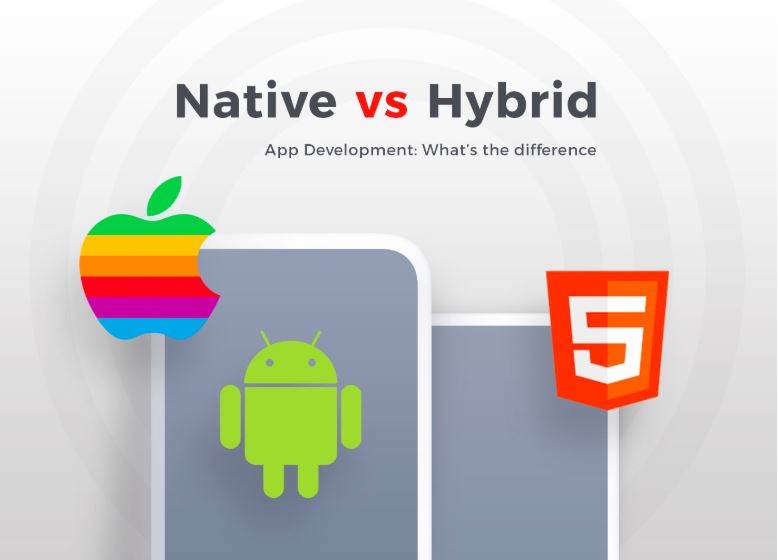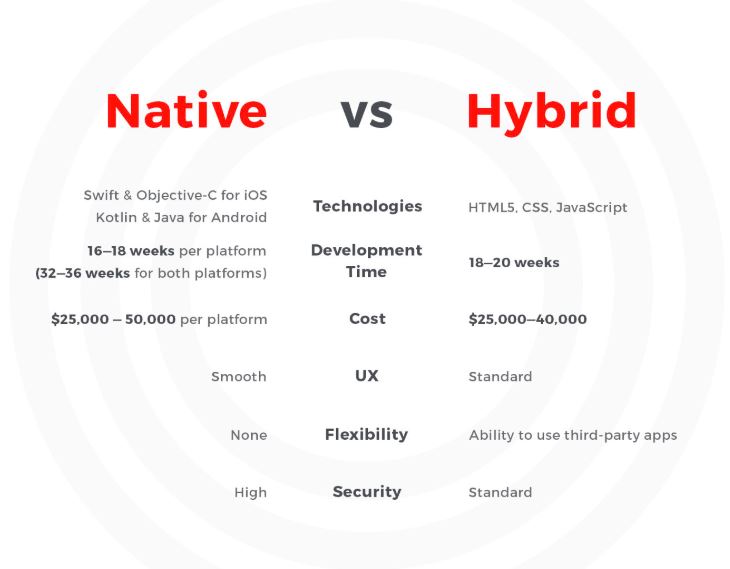 In this article, we compare native and hybrid app development and explain which type of app is better for achieving your goals. If you want to make an app for both iOS and Android, you can use one of these options:
In this article, we compare native and hybrid app development and explain which type of app is better for achieving your goals. If you want to make an app for both iOS and Android, you can use one of these options:
- Develop a native app for each platform
- Use frameworks and technologies for hybrid development
Each of these methods offers unique features, uses different programming languages, and allows you to achieve different goals. If you don’t know whether to choose a native or hybrid app, you can find all the information you need to make your choice below.
We’ll describe each type of app in detail, exploring their strengths and weaknesses and helping you understand the difference between them.
What is a hybrid application?
A hybrid app can run on different platforms, such as iOS and Android. To make a hybrid application, you can use frameworks like React Native, Ionic 2+, Xamarin, and Cordova. Usually, there are three technologies used in hybrid app development:
- HTML5
- CSS
- JavaScript
A hybrid app is a web-based app that connects with the hardware of the device it runs on.
Why hybrid app development?
Hybrid app development has some advantages we should speak about.
Cost
A hybrid app doesn’t need to be coded especially for each platform. So you don’t need extra developers to make an application for more than one operating system. For this reason, hybrid app development is cheaper than native. If your goal is to decrease the cost to make a mobile app, choose hybrid development.
Support
If you’re making a content-centered application like a news app, you should think about constantly updating content. It’s easier to make changes to a hybrid app.
Time
One of the advantages of a hybrid app is development time: You don’t need much time to build and launch a hybrid application. This is important because of the tough competition in the market. If you have a unique idea, you need to be the first to make it a reality.
Native app development
A native application is created for a single platform like Android or iOS. The main feature of native mobile application development is that the app is coded in a language native to the platform:
- iOS – Swift & Objective-C
- Android – Kotlin & Java
Developers need to keep in mind specific aspects of each platform because they’re very different in terms of graphical styles, data management, visual effects, etc.
Why native app development?
Now let’s look at the main advantages of native app development.
User experience
The user experience determines how your users feel when they use your application. It’s important to provide effects and animations that catch the user’s eye. Native applications work smoothly because they’re specially created for a single operating system.
If you want to make the same native app for iOS and Android, you have to develop two different applications in different programming languages.
This is why native app development is better if you want to make the best UX. When you develop an app for a specific platform, you can pay attention to each specific UX element.
Speed & flexibility
A native application can perform better because it’s optimized for a specific platform. Additionally, native development allows developers to easily implement new features.
Native apps can be implemented in the operating system stack and have access to the camera, calendar, GPS, and other device hardware. Currently, hybrid apps have a lot of limitations when it comes to using third-party tools because of differences between platforms.
Security
If you make an app that collects users’ data, you have to think about security. When you develop a native application, you can use all the hardware resources to protect data from being removed or stolen
Conclusions
 Now you understand the difference between a native app and a hybrid app. Each has its advantages and disadvantages, and in most cases, the advantage of one type is a disadvantage of the other. So which should you choose when developing your own application? It depends on your goal.
Now you understand the difference between a native app and a hybrid app. Each has its advantages and disadvantages, and in most cases, the advantage of one type is a disadvantage of the other. So which should you choose when developing your own application? It depends on your goal.
Hybrid development can help you make your application without spending too much time and money. But native app development allows you to make a really high-quality application with a great UX.
We hope you now have enough information to choose the best option for your needs. Good luck with your project.

